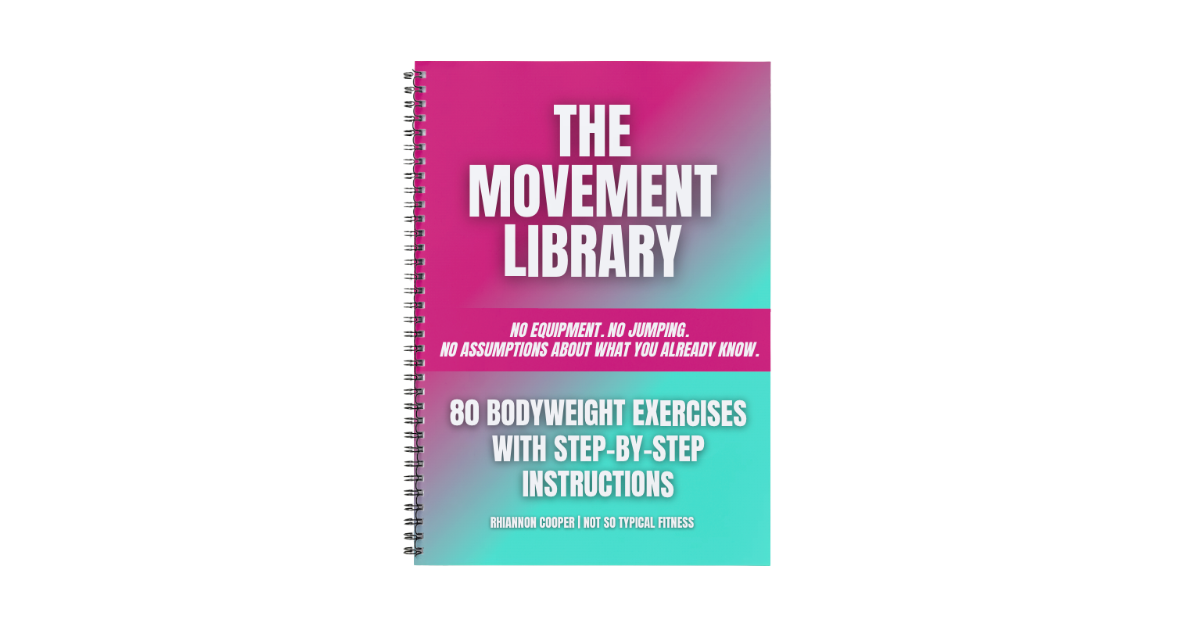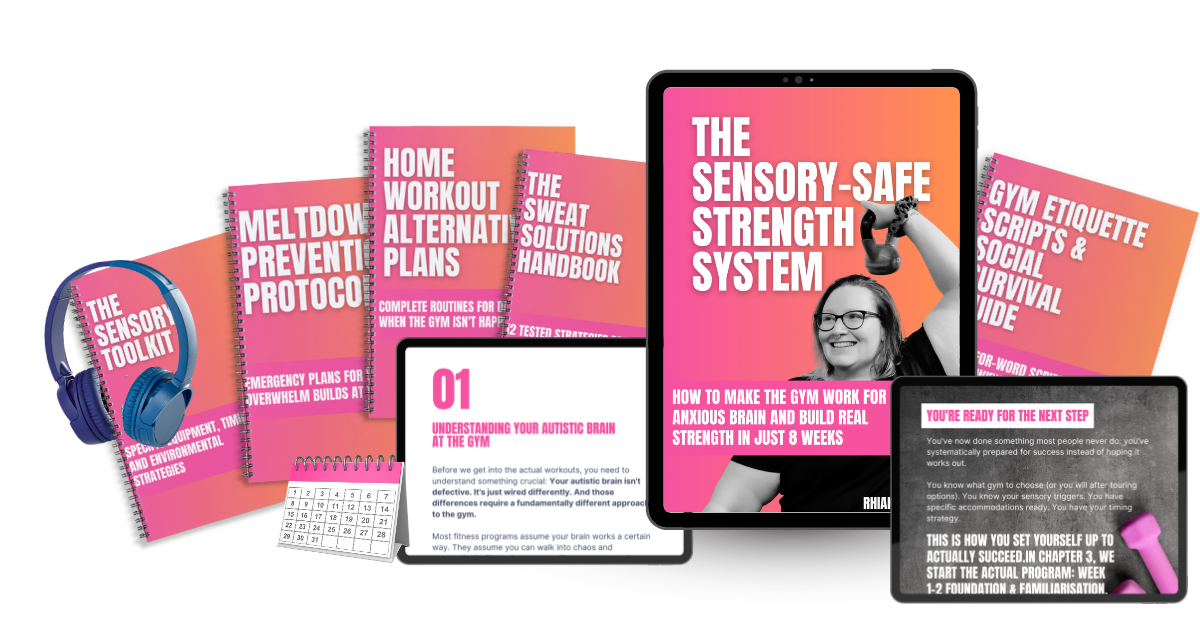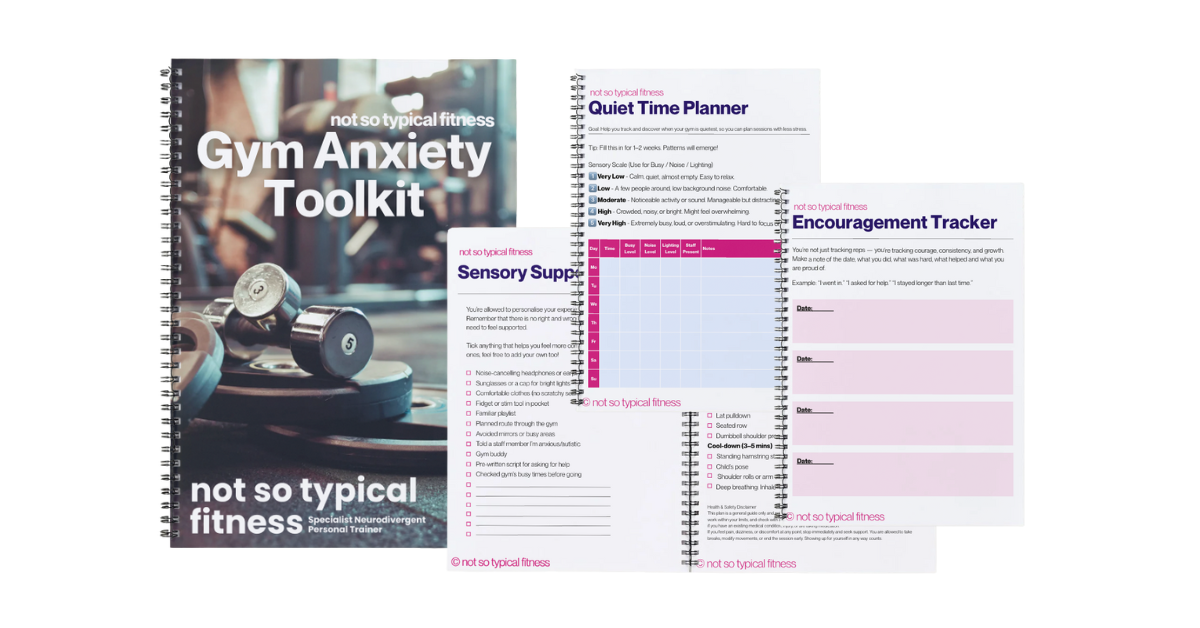Beginner’s Complete Gym Guide (2026)
New to the gym? This comprehensive guide covers everything you need to start your fitness journey with confidence, from essential equipment to managing gym anxiety. Whether you're neurotypical or neurodivergent, this guide will help you navigate the gym on your terms.
Walking into a gym for the first time can feel overwhelming (trust me, I know). The unfamiliar machines, experienced gym-goers who seem to know exactly what they're doing, bright fluorescent lights, loud music, mirrors everywhere, and that nagging voice whispering you don't belong there.
If this sounds familiar, you're not alone. Research shows that over 80% of people feel intimidated by the gym initially, and for neurodivergent individuals, sensory overwhelm can make it even more challenging. This complete guide covers everything you actually need to know to start your fitness journey with confidence.
Are you nervous, anxious or overwhelmed by the gym?
Try the Sensory-Safe Strength System — 8 weeks of structured, sensory-friendly workouts designed for your brain.
In this guide, you'll learn:
Why you don't need to be fit before joining a gym
Essential equipment you actually need (spoiler: it's less than you think)
Gym etiquette and what to expect on your first visit
How to start your first workout safely
Strategies for managing gym anxiety and sensory overwhelm
How to make the gym work for neurodivergent brains
What progress actually looks like (hint: it's not just weight loss)
Neurodivergent-specific resources:
Ultimate Guide to Neurodivergent Fitness — Comprehensive strategies for autism and ADHD
Sensory-Friendly Fitness Guide — Managing sensory sensitivities in gym environments
Free Gym Anxiety Toolkit — Includes busy tracker, quiet-time planning worksheet, and sensory checklist
Why You Don’t Need to Be Fit to Start at the Gym
Here's the biggest myth about joining a gym: that you need to be in shape before walking through the doors. This couldn't be further from the truth.
The gym is where you go to build fitness, not prove you already have it. Whether you're starting your first workout routine or returning after a break, you belong there from day one.
Think of it this way: you don't need to be clean before taking a shower. The same logic applies here; you don't need to be fit before going to the gym.
Find out more about my own health, fitness and weight loss journey.
What to Bring to the Gym: Beginner's Essential Equipment List
Forget the expensive gear and matching outfits. Here's what you actually need:
Must-haves:
Comfortable workout clothes you can move in freely
Supportive athletic shoes (don't need to be expensive)
Water bottle to stay hydrated
Small towel for wiping down equipment
Nice-to-haves (but not necessary):
Wireless headphones for music or podcasts
Simple gym bag
Basic fitness tracker
Comfort and confidence matter far more than aesthetics. Save the fancy gear purchases until you know what type of workouts you enjoy most.
Looking for gym clothing recommendations? Check out my sensory-friendly fitness discount codes to find comfortable options that work for neurodivergent bodies.
Gym Etiquette for Beginners: What to Expect on Your First Day
Do People Judge You at the Gym? The Truth About Gym Anxiety
When you're new, it can feel like all eyes are on you. The truth is, most people are focused on their own workouts, their own form, their own music. They're often just as self-conscious as you are.
Basic Gym Rules Everyone Should Follow
Wipe down equipment after use (cleaning supplies are usually nearby)
Don't monopolise equipment during busy times
Ask politely, "How many sets do you have left?" before using equipment
Keep phone conversations brief and quiet
Give others space to work out comfortably
When Is the Gym Least Busy? Understanding Peak vs. Quiet Hours
Most gyms are busiest:
Early morning (6-8 AM)
Evening (5-7 PM)
Weekend mornings
If you're dealing with gym anxiety, consider visiting during off-peak hours. Learn more in my guide on when is the gym quietest.
How Long Should Beginners Spend at the Gym?
There's no rule that says you have to spend an hour in the gym or push yourself to your limits every time. Start with something simple:
Ten minutes on the treadmill
A few bodyweight movements
A short walk around the gym to familiarise yourself
If all you do is show up and stretch, you're doing more than you did yesterday. And that counts.
Your First Gym Workout: Simple Exercises for Complete Beginners
Best Beginner Gym Exercises: Cardio and Strength Training
Start with these beginner-friendly options that require minimal instruction:
Best Cardio Machines for Beginners
Treadmill: Start with walking, gradually increase speed
Stationary bike: Low impact, easy to control intensity
Elliptical machine: Full-body, low-impact workout
Beginner-Friendly Strength Training Equipment
Bodyweight exercises: Squats, wall push-ups, planks
Light dumbbells: Start with 1-3kgs
Resistance machines: Usually have clear instruction diagrams
20-Minute Beginner Gym Workout Plan (Step-by-Step)
5-minute warm-up: Easy walk on treadmill
10 minutes: Try 2-3 different machines for 2-3 minutes each
5-minute cool-down: Gentle stretching in the stretching area
For more structured guidance, download my free Gym Basics: Beginner's Guide.
Prefer to build strength at home first?
The Movement Library (£9) gives you 80 exercises requiring zero equipment. Build confidence at home, then transition to the gym during quiet times.
How Long Should Beginners Stay at the Gym?
Start with 15-30 minutes maximum. There's no rule requiring hour-long sessions. If you show up and spend 10 minutes on the treadmill, you've accomplished more than staying home.
Quality over quantity; focus on consistency rather than duration.
How to Overcome Gym Anxiety: 9 Strategies That Actually Work
Gym anxiety affects millions of people. Here are evidence-based strategies to manage it:
3 Things to do if you feel nervous before starting the gym:
Take a gym tour during quiet hours
Ask about beginner-friendly classes or orientations (here's what to expect during gym inductions)
Consider bringing a supportive friend initially
3 Things to do if you feel Anxious or Overwhelmed During your Gym Session
Focus on your breathing and form
Remember: everyone started as a beginner
Use positive self-talk: "I belong here" instead of "I don't fit in"
3 Things to do if you feel Overwhelmed at the Gym
Step outside for fresh air
Use the restroom as a quiet space to regroup
Download my free Gym Anxiety Toolkit for practical tools including a busy tracker template, quiet-time planning worksheet, and sensory preparation checklist.
Neurodivergent Gym Guide: Making Fitness Work for Autism and ADHD
Traditional gym environments can feel overwhelming if you're neurodivergent. Here's how to adapt:
Managing Sensory Overload at the Gym (Autism & ADHD Tips)
Choose quieter times or less crowded areas
Wear noise-canceling headphones if sounds are overwhelming
Find corners with fewer mirrors if they're visually distracting
Ask staff about sensory-friendly hours
Gym Strategies for ADHD Executive Function Challenges
Write your workout plan beforehand
Set phone timers for each exercise segment
Use apps that guide you through routines step-by-step
Start with a simple, repeatable routine
Gym Social Anxiety: How to Feel More Comfortable
Practice asking staff simple questions during less busy times
Use the buddy system when possible
Consider online personal training initially
Your gym experience should work with your brain and body, not against them. Read my ultimate guide to neurodivergent fitness for more strategies.
Gym Progress Beyond Weight Loss: What to Track Instead
We're often told that the only reason to go to the gym is to lose weight, but that's only one tiny part of the fitness picture. Track these meaningful indicators of progress:
Physical Benefits of Going to the Gym (Beyond Weight Loss)
Increased energy throughout the day
Better sleep quality
Improved strength (lifting groceries feels easier)
Enhanced mood and reduced stress levels
Better posture and less back pain
Building Gym Confidence: Non-Physical Progress to Celebrate
Feeling comfortable asking questions
Trying new equipment without fear
Staying for your planned workout duration
Walking into the gym without anxiety
How to Build a Consistent Gym Habit as a Beginner
Showing up regularly (even for short sessions)
Developing a routine that fits your lifestyle
Building the habit of prioritising your health
These non-scale victories deserve celebration and are often more sustainable than focusing solely on the scale.
Finding a Personal Trainer for Beginners: What to Look For
Starting a fitness routine doesn't have to be a solo journey. As gyms recognise the importance of personalised support, many are expanding their services to include specialised guidance for different needs.
Types of Gym Support: Personal Trainers, Classes, and Coaching
Gym Accountability and Community Support for Beginners
Beginner-friendly fitness groups
Online forums and communities
Workout accountability partners
Specialised support for neurodivergent individuals
If you're neurodivergent or have specific needs, seek out fitness coaches and communities that understand your challenges. I offer neuroinclusive personal training in Wolverhampton and online.
4-Week Gym Starter Plan for Complete Beginners
Week 1: Research and Visit
- Research local gyms and their beginner programs
- Schedule tours during off-peak hours
- Ask about trial memberships or day passes
Week 2: First Visits
- Plan simple 15-20 minute sessions
- Focus on getting comfortable with the environment
- Try 1-2 pieces of cardio equipment
Week 3: Build Routine
- Aim for 2-3 visits this week
- Add simple strength exercises or machines
- Start tracking how you feel after workouts
Week 4: Expand Gradually
- Increase session length if comfortable
- Try a beginner-friendly group class
- Consider asking for professional guidance
Remember: You don't need to transform overnight. Progress comes from consistent small steps.
Get Personalised Gym Support for Neurodivergent Beginners
I offer 1:1 support and a free neurodivergent-friendly fitness community where you can ask questions, share wins, and get honest advice without judgment.
The gym can feel much less intimidating when you know what to expect and have a plan. Remember, the hardest part is often just walking through the door, and you don't have to do it alone.
If you’re finding that first step too overwhelming, consider getting a copy of the Sensory Safe Strength System, which will take you from nervous to confident in 8 weeks.
Take action today: Choose one gym to visit this week. You don't need to commit to a membership yet; just take that first step through the door.
Free Resources to Help You Get Started
Gym Anxiety Toolkit — Busy tracker, quiet-time planning worksheet, sensory checklist
Gym Basics: Beginner's Guide — Equipment breakdown, what everything does
When Is the Gym Quietest? — Find the best times to avoid crowds
Ultimate Guide to Neurodivergent Fitness — Strategies for autistic and ADHD adults
Paid Programs and Personal Training for Beginners
The Sensory-Safe Strength System (£27) provides 8 weeks of progressive workouts designed specifically for anxious brains, with zero-decision workout days and word-for-word scripts for every awkward gym situation.
For personalised support: My Gym Confidence Starter Package (£349) includes 4 weeks of 1:1 personal training sessions at JD Gym Wolverhampton or Codsall Leisure Centre.
This guide was last updated in January 2026 to reflect current gym practices and inclusive fitness approaches.
Frequently Asked Questions About Starting at the Gym
What should I bring to the gym on my first day?
Pack comfortable workout clothes, athletic shoes, a water bottle, and a small towel. Everything else can be acquired later based on your preferences and needs.
How often should beginners go to the gym?
Start with 2-3 times per week, allowing rest days between sessions for recovery. Consistency matters more than frequency when building sustainable fitness habits.
Is it okay to ask for help at the gym?
Absolutely! Gym staff and personal trainers are there to help. Most experienced gym-goers are also happy to answer quick questions about equipment or form.
What if I can't complete my planned workout?
That's perfectly normal and common. Listen to your body—some exercise is always better than none. Adjust your expectations and celebrate what you accomplish.
How do I know if I'm using equipment correctly?
Most machines have instruction placards with pictures showing proper form. When in doubt, ask staff for a demonstration. Many gyms offer free equipment demos for new members.
What if I feel judged or out of place?
These feelings are normal but often unfounded. Focus on your own journey and remember that everyone started as a beginner. Consider visiting during quieter hours initially. Read more about overcoming gym anxiety or have a read of the free gym anxiety toolkit.




